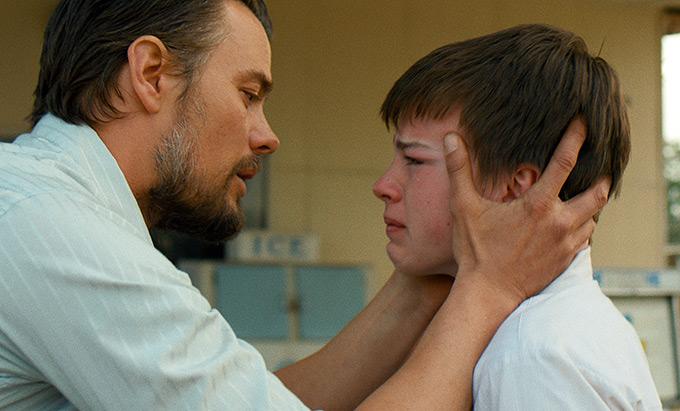 “Lost in the Sun” gets most elements right in order to put together one of those gritty and melancholic southern crime dramas, except for when it comes to producing a unique screenplay and direction that rises above mediocrity. Robert Barocci’s cinematography captures the desolation of southern highways with static and grand vista shots worthy of the film his lens is clearly aping, The Coen Brothers’ nihilist masterpiece “No Country For Old Men.” Meanwhile, Mike Choi’s deftly paced editing makes sure the audience soaks in Barocci’s solid DP work without resorting to needless quick cuts or narrative gimmicks in order to create a more “modern” or “edgy” indie. And Daniel Hart’s subtle yet effectively somber score, although derivative of many examples of the genre, infuses the film with just enough dramatic credibility.
“Lost in the Sun” gets most elements right in order to put together one of those gritty and melancholic southern crime dramas, except for when it comes to producing a unique screenplay and direction that rises above mediocrity. Robert Barocci’s cinematography captures the desolation of southern highways with static and grand vista shots worthy of the film his lens is clearly aping, The Coen Brothers’ nihilist masterpiece “No Country For Old Men.” Meanwhile, Mike Choi’s deftly paced editing makes sure the audience soaks in Barocci’s solid DP work without resorting to needless quick cuts or narrative gimmicks in order to create a more “modern” or “edgy” indie. And Daniel Hart’s subtle yet effectively somber score, although derivative of many examples of the genre, infuses the film with just enough dramatic credibility.
For the past ten years, Josh Duhamel has been stuck as a pretty boy placeholder for obnoxious blockbuster franchises (“Transformers”) and lame Nicholas Sparks adaptations (as if there’s any other kind to begin with). Nearing his mid-40s without a project where he can stick out as a dramatic lead, it makes sense for him to jump on an indie like “Lost in the Sun” in order to not only stretch his acting muscles, but to also prove to the world that he’s more than a stopgap until Optimus Prime returns for more screen time.

Duhamel’s character, John, is a career criminal who spent his entire life committing petty robberies. Now that he wants to move onto a more legitimate living and a normal life thanks to a vital addition to his existence, he realizes that shedding his old skin might not be as easy as he wishes it to be. John is a highly typical archetype, to be sure. How many times have we seen a character who could be described with the exact same words in a gritty crime drama? I guess the more appropriate question would be, how many times have we not seen this character?
What makes Duhamel’s job that much harder is that practically nothing else that would have make the character stand apart from this cliché and breathe on his own is provided for him through the by-the-numbers screenplay. Yet Duhamel manages to bring emotion and depth to a character that wasn’t provided with much of either on paper. His equally grizzled and solemn performance, while not necessarily captivating, proves that he could easily transition into similar dramatic roles as he reaches middle age and keeps rocking his salt-and-pepper sideburns.

So, if all these elements come together, what keeps “Lost in the Sun” from rising even an inch above a mediocre and instantly forgettable crime drama? That would be writer/director Trey Nelson’s bland screenplay that takes the template for such a film and forgets to fill in the blanks with unique characters and an unpredictable storyline, and his milquetoast direction that does the bare minimum in putting together the kind of feature we’ve seen a million times before.
“Lost in the Sun” is basically Clint Eastwood’s slightly underrated “A Perfect World,” without Jehovah’s Witnesses or Kevin Costner’s hairy armpit. After his mother’s death, shy teenager Louis (Josh Wiggins in a perfectly serviceable performance for his age and experience) has to go live with his grandparents in New Mexico. Before Louis can get on a bus to reach his destination, a mysterious man named John picks him up and tells him that he’ll drive him there. Along the way, Louis finds out that John’s a criminal who robs convenience stores and small banks in order to pay off a $20,000 debt. Louis’ initial shock about his driving partner’s line of work leads to him being inevitably pulled into a life of crime, which provides the kind of rush that no previously repressed teenager could possibly fight against.

The biggest misstep in Nelson’s screenplay, which is unfortunately accentuated through his confused direction, is that he treats a “twist” about the relationship between Louis and John, as if any member of the audience will not figure out the big secret half a minute into the film. As Nelson piles on one clunky visual hint after other, the tedium of waiting for the movie to catch up with what you’ve already figured out is unbearable.
Nelson’s ill-advised confidence in his twist could be forgiven if he had also spent more time fleshing out the characters. John wants to change now that he has a new and very important person in his life, while Louis has to choose between enabling John and falling deeper into a life of crime himself. Such basic themes as a desperate search for redemption and the inescapability of one’s nature can be found in many films similar to “Lost in the Sun,” and Nelson’s take on these themes unfortunately don’t bring anything new to the table. “Lost in the Sun” is a technically proficient but achingly typical gloomy southern crime drama, one that audiences can seek out if they exhausted every other similar film. [C]

